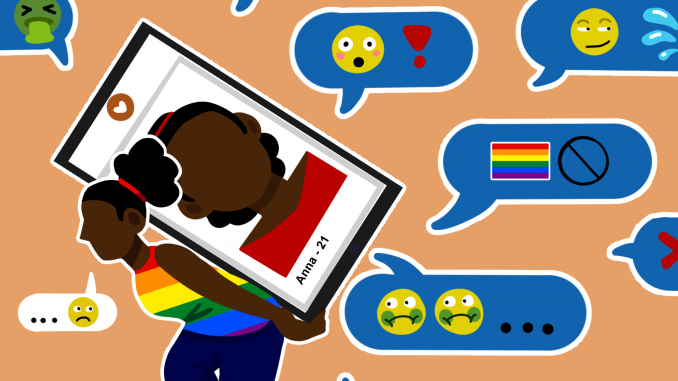
Dating apps present a unique set of challenges for people of color in the LGBTQ community.
About 65 percent of same sex couples met online in 2017, compared to about 39 percent for heterosexual couples, according to a 2019 study in the Proceedings of the National Academy of Sciences.
Queer People of Color, a student organization that empowers and educates queer people of color at Temple University and in Philadelphia, discussed dating in the queer community at its meeting on Sept. 23.
Students in the organization said they have not always had positive experiences while on dating apps, and identified Tinder, Bumble, Her and Coffee Meets Bagel as the most commonly used platforms.
Indigo Vaughan, a freshman political science major who mostly uses Tinder, said people automatically assume things about his sexuality by the way he looks, which can be a struggle.
“People have trouble reading me and when I tell them I’m non-binary, and then I also say I’m attracted to girls. People just get confused as to how that works,” Vaughan said. “People just automatically assume if you’re queer and you’re masculine-presenting that you have to like guys and that’s not always the case.”
Ashia Burns, a junior psychology major, said when using Tinder she has often been assumed as cisgender and straight and receives negative reactions when clarifying she is non-binary and bisexual.
“A lot of the interaction would feel like what I call ‘gender-role scripts.’ The guy has to come up to the girl, and the girl has to be really quiet and you have to go through these specific motions, especially with men,” Burns said. “That was always difficult because that is not the mold that I feel comfortable with when it comes to interacting with people. And once you establish that, people would disappear because to them it’s read as a challenge.”
As a Black woman, Burns said she has yet to find a dating app she likes.
“Especially when it comes to not being the light-skinned with really loose curly hair type of black woman that is often fetishized and exoticized,” Burns said. “That was another layer of oppression that sort of goes on in dating apps for me, but that’s the reality of the experience sometimes. It’s not always this cookie cutter, super happy experience. Sometimes it is something negative.”
Burns worries about having her identity questioned when using dating apps.
“I was also afraid of really falling into a certain sort of stereotype or anything like that because there’s a lot of like stuff that goes around about bisexual people being promiscuous,” Burn said.
“And then there’s also the stigma that goes around with Black women being promiscuous. And to be both of those things at the same time is really kind of confounding.”
Bisexuals are often stigmatized by straight people and the queer community, according to a 2011 survey by the LGBT Advisory Committee. Around 47 percent of people would not date someone who is bisexual, while 19 percent were undecided, according to a survey by Adam and Eve, a sex toy company.
QPOC discussed was having a dating app exclusively for queer people of color during the meeting.
Burns said she thinks this would be a good idea because of racial discrimination within the queer community.
“It’s really hard to feel that you are being your full and open true self because yes, you are able to show your queerness, but you also have to hold back the parts of you that are so important too like your ethnicity and your culture,” Burns added.



Be the first to comment